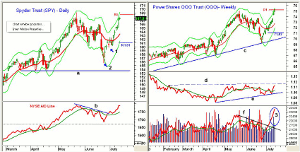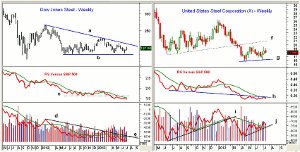The new record highs has some analysts throwing caution to the wind with their euphoric forecasts, but MoneyShows’s Tom Aspray recommends a risk-focused approach and suggest you avoid one sector in particular.
It was a stellar week for the stock market as the late buying pushed all of the major averages into positive territory. It was hard to find a bearish voice after Friday’s close but most investors do not benefit from the advice of these analysts. Overnight data from China was better than expected and the futures are higher in early trading.
One well-known technical analyst said Friday that he would buy the market now. Unfortunately, the interviewer never asked the follow-up question as to what it would take for him to change his view or what type of stop he would use on this position.
Now, while I would also expect the market to be significantly higher between now and the end of the year, that does not mean you should buy everything and at any price. I think that the regular investor or trader must pay attention to the risk of each investment.
The further improvement in the market internals noted on Friday continues to favor the long side of the market but not at any price as most of the major averages are quite overextended. The charts below reveal the hazards of chasing the index-tracking ETFs and also why one sector should be avoided.
Chart Analysis: The daily chart shows that the Spyder Trust (SPY) closed Friday at $167.51, which was not far below the quarterly R1 resistance at $168.48.
- The daily starc+ band was tested last Thursday and is now at $169.71. The prior intra-day high was $169.07.
- The quarterly pivot is at $161.01 with the last swing low at $159.86, which was the June 28 low.
- A stop at this level would mean a loss of 4.8% but a more comfortable stop would be under the June lows at $157.42.
- A drop below this level would mean a loss of 7.8% for those who bought Friday’s close.
- The daily chart has initial support in the $165 area, which is 1.5% below last week’s close.
- There is better support in the $163-$163.40 area, which includes the rising 20-day EMA.
- The NYSE A/D line broke its downtrend, line b, on June 28 and made marginal new highs Friday.
- The A/D line would need to decisively break below the June lows to weaken the outlook.
The PowerShares QQQ Trust (QQQ) was almost 1% stronger than the SPY last week and closed at $75.30, which was above the daily starc + band and the quarterly R1 resistance.
- The weekly starc+ band is at $76.68 with the quarterly R2 at $79.10.
- For longs established on Friday’s close, the tightest stop would be under $71.03 or the late June low of $70.78.
- This would be a risk of 6% while a stop under the June low of $69.15 would be a risk of 8.2%.
- The daily relative performance surged last week but is still below the resistance at line d.
- The sharp rise in the OBV last week reflects heavy buying as the downtrend, line f, was overcome on July 3.
- The gap between the OBV and its WMA is quite large (see ellipse #3), which also reflects an overextended market.
- The gap at $73.62 to $74.25 is the first support with the rising 20-day EMA at $72.67.
NEXT PAGE: Avoid This Lagging Sector
|pagebreak|The Dow Jones Steel Index (DJUSST) is down 3.7% for the year and down 26% from the early 2012 highs.
- The chart shows what could be a bottom formation, line b, and closed with nice gains last week.
- There is next resistance in the 212-214 area, line a, and the early 2013 highs.
- The relative performance dropped through support at line c, at the end of March, which reaffirmed its downtrend.
- The RS line is still well below its declining WMA.
- The weekly OBV also shows a similar break of key support, line e, in March.
- The OBV is still below its WMA and the downtrend, line d.
- There is weekly support in the 180 area.
United States Steel Corporation (X) is one of the better-known and weaker steel companies.
- The chart shows that major support, line f, was broken in March, consistent with the resumption of the major downtrend.
- The chart shows that prices are now trying to hold the support in the $15.80-$16.11 area, line g.
- The upside should be limited by the heavy resistance now in the $19.70-$20.85 area.
- The relative performance looks very weak as it broke support, line h, in March.
- So far, the RS line has not been able to move back above this resistance or its WMA.
- The on-balance volume (OBV) violated its uptrend, line i, in early February.
- The OBV has been in a gradual uptrend from the April lows, line j, and is just barely above its declining WMA.
- Though the OBV shows a potential positive divergence the weekly chart still looks negative.
What it Means: The analysis of the potential risk of buying Friday’s close in the SPY or QQQ is a process that one should do with any position they are considering.
As I mentioned early in the year, determining your buy levels is an important part of successful investing or trading.
The market could still rally another 1-3% before we get a correction. Keep an eye on the support levels outlined above, and with a lower close, I will be better able to target the buying levels in my column or on Twitter.
After such a strong market rally, some focus on the weakest sectors or stocks but this requires quick action and does not work in the long run. There are several steel stocks, like Steel Dynamics (STLD) and Nucor Corp. (NUE), that look better than United States Steel Corporation (X). The overall sector is lagging the S&P 500, and I would rather concentrate on the market-leading sectors like those discussed in Red-Hot Summer Sectors.
How to Profit: No new recommendation.












